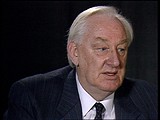You searched for: 回国加速器【输入∶海归returnees加速器】海归returnees加速器app海归returnees加速器publishers海归returnees加速器top海归returnees加速器published海归returnees加速器apps海归returnees加速器and海归returnees加速器more海归returnees加速器in海归returnees加速器United海归returnees加速器States海归returnees加速器Google海归returnees加速器Play海归returnees加速器Store
<< Previous | Displaying results 2641-2650 of 2669 for "回国加速器【输入∶海归returnees加速器】海归returnees加速器app海归returnees加速器publishers海归returnees加速器top海归returnees加速器published海归returnees加速器apps海归returnees加速器and海归returnees加速器more海归returnees加速器in海归returnees加速器United海归returnees加速器States海归returnees加速器Google海归returnees加速器Play海归returnees加速器Store" | Next >>
-
Bruna Sevini
ID CardBruna was the oldest of two children born to Italian-speaking Jewish parents who had settled in the cosmopolitan city of Trieste. Her father, born in Vienna, served in the Austro-Hungarian army during World War I. He became a naturalized Italian during the 1920s after marrying Bruna's mother. Growing up in fascist Italy, Bruna attended public schools in Trieste and felt proud to be an Italian. 1933-39: In September 1938 Bruna was surprised to see anti-Jewish graffiti. Then anti-Jewish race laws were…
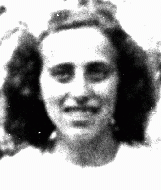
-
Bela Blau
ID CardBela's city of Bratislava, located on the banks of the Danube river, had an old and important Jewish community. Bela was the eighth child in his large Jewish family. His father was a furrier. At age 16 Bela began working as a salesman for a textile business. In 1930 he was called up for 18 months of army service. 1933-39: Bela and his wife moved to the Slovakian city of Zilina. Their son was born in November 1937. Bela worked for a German photographic company until 1938, when he lost his job because he…
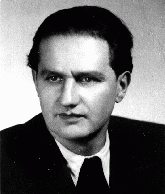
-
Semyon Menyuk
ID CardSemyon was born to a Jewish family in the small village of Komarovo in Polish Ukraine. His parents were farmers and tended their own fields while managing the estate of a Polish landowner who lived in Warsaw. Of the estimated 200 families living in Komarovo, only five were Jewish. 1933-39: Since there was no Jewish school in their town, Semyon's parents sent him to the nearby city of Sarny to study. He finished school in 1938 and returned to Komarovo to help his parents with their farm. But in September…
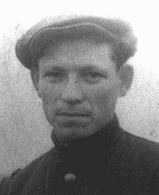
-
Ezra BenGershom
ID CardEzra was born to a Jewish family in the Bavarian city of Wurzburg. In the summer of 1929, his father, a third-generation rabbi, accepted a position as a district rabbi, guiding 12 congregations in Upper Silesia. In primary school, Ezra, who showed a keen interest in chemistry, was often harassed by his schoolmates for being Jewish. 1933-39: Because of his "Nordic" features, Ezra was able to frequent places where Jews couldn't go. In 1938, one year after he entered a Jewish secondary school in Berlin, the…
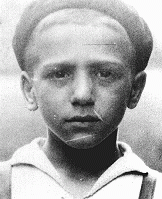
-
Settchen Oppenheimer
ID CardSettchen was one of three children born to a religious Jewish family in a small town in the German state of Hessen. Her father was a cantor and kosher butcher. Settchen completed grade school during the 1880s. Because of a digestive disease, Settchen was largely homebound. She never married, and lived with her younger sister and brother-in-law. 1933-39: Reichenbach was a quiet town. Its largely Protestant inhabitants were generally not antisemitic. After Hitler came to power in 1933, the Nazis staged…
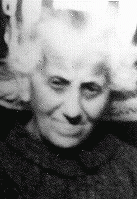
-
Robert Wagemann describes secret Jehovah's Witness prayer meetings in Nazi Germany
Oral HistoryRobert and his family were Jehovah's Witnesses. The Nazis regarded Jehovah's Witnesses as enemies of the state for their refusal to take an oath of loyalty to Adolf Hitler, or to serve in the German army. Robert's family continued its religious activities despite Nazi persecution. Shortly before Robert's birth, his mother was imprisoned briefly for distributing religious materials. Robert's hip was injured during delivery, leaving him with a disability. When Robert was five years, he was ordered to report…
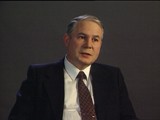
-
Jerry von Halle describes restrictions on Jews in Amsterdam
Oral HistoryIn 1933 Jerry's family moved from Hamburg to Amsterdam. The Germans invaded the Netherlands in 1940. In 1941, Jerry's brother perished in Mauthausen. Jerry and his parents went into hiding first in Amsterdam and then in a farmhouse in the south. The Gestapo (German Secret State Police) arrested Jerry's father in 1942, but Jerry and his mother managed to return to their first hiding place. They were liberated in Amsterdam by Canadian and Jewish Brigade troops.
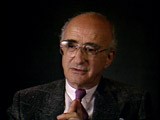
-
Jerry von Halle describes hiding in Amsterdam
Oral HistoryIn 1933 Jerry's family moved from Hamburg to Amsterdam. The Germans invaded the Netherlands in 1940. In 1941, Jerry's brother perished in Mauthausen. Jerry and his parents went into hiding first in Amsterdam and then in a farmhouse in the south. The Gestapo (German Secret State Police) arrested Jerry's father in 1942, but Jerry and his mother managed to return to their first hiding place. They were liberated in Amsterdam by Canadian and Jewish Brigade troops.
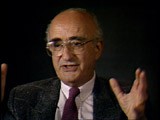
-
Jerry von Halle describes hunger while in hiding in Amsterdam
Oral HistoryIn 1933 Jerry's family moved from Hamburg to Amsterdam. The Germans invaded the Netherlands in 1940. In 1941, Jerry's brother perished in Mauthausen. Jerry and his parents went into hiding first in Amsterdam and then in a farmhouse in the south. The Gestapo (German Secret State Police) arrested Jerry's father in 1942, but Jerry and his mother managed to return to their first hiding place. They were liberated in Amsterdam by Canadian and Jewish Brigade troops.
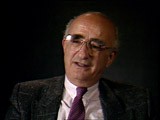
-
Preben Munch-Nielsen describes the precautions taken during boat crossings which took Jews to safety in Sweden
Oral HistoryPreben was born to a Protestant family in Snekkersten, a small fishing village. The Germans invaded Denmark in 1940. Preben became a courier in the resistance. When the Gestapo (German Secret State Police) began hunting down Jews in Denmark in October 1943, Preben helped hide refugees in houses near the shore and led them to boats which took them to Sweden. Preben himself had to take refuge in Sweden in November 1943. He returned to Denmark in May 1945.
